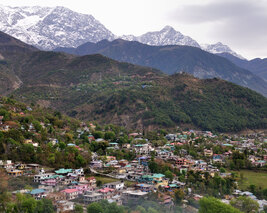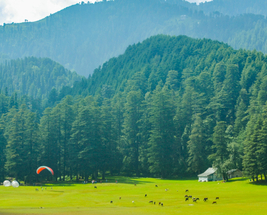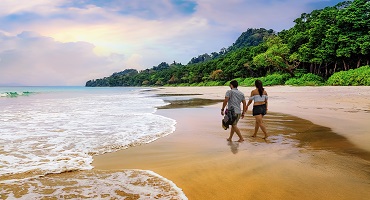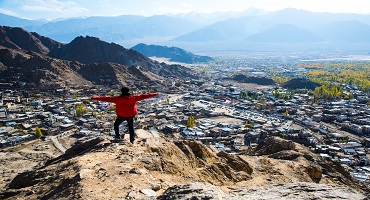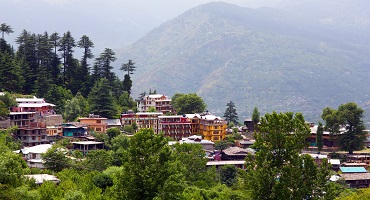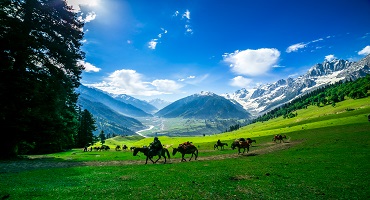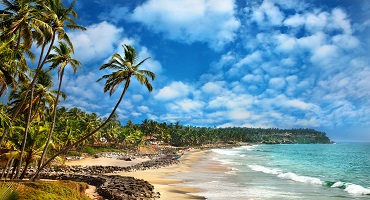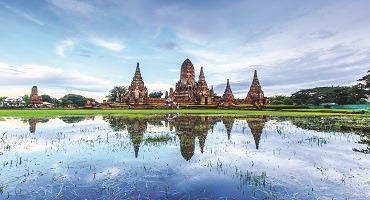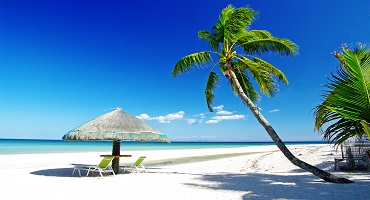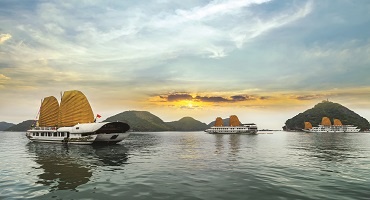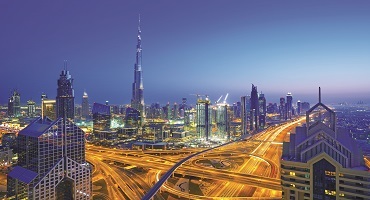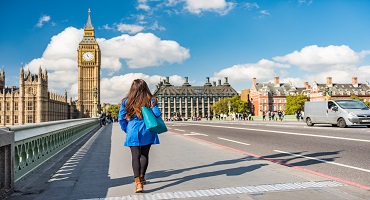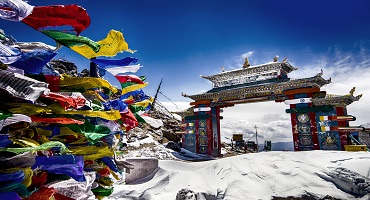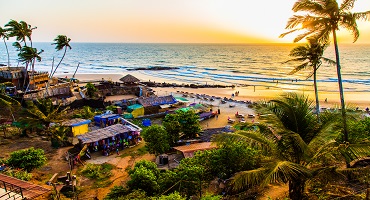Best time to visit Khajjiar
Khajjiar is an oasis in the sky, a quintessential Himachali hill station where the colours are brighter, and the fragrances are sweeter. The Mini Switzerland of India, it is everything one could dream of. A canvas of majestic mountains, winding valleys, whooshing rivers, verdant forests and rustling meadows. But beyond its natural charms lie other attractions and experiences. From navigating thrilling adventure sports to exploring quaint villages and historic temples, travellers have the opportunity to delve into a fascinating and multi-sensorial universe.
So, what time is the best time to visit Khajjiar? Although this hill station is beautiful and fun throughout the year, you still have to make the crucial decision of when to go. Individuals will differ in their answers depending upon their tolerance to heat, cold and moisture. Furthermore, people may opt for a certain season over another based on when they can carve out the time. But if you’re one of those confused souls, read ahead for some much-needed clarity!
Here is a snapshot of weather in Khajjiar at winter, summer and monsoon. So, what will it be?
Peak Seasons – April to June or July to September
Mid-Season – October to March
|
Travel Seasons
|
Min/Max Temperature
|
Season
|
|
November to March
|
6-27°C
|
Winter- Severe cold
|
|
April to June
|
17-38°C
|
Mild Summer
|
|
July to September
|
24-34°C
|
Mid-high rainfall
|
Khajjiar weather in Winter (November to March)
Temperature – The air temperature during winter generally fluctuates between 6°C and 27°C, although it can sometimes drop to sub-zero.
Weather – The weather in Khajjiar in winter is extremely harsh. With temperatures gracing single digits as well as the minus scale, the climate takes on an icy cold nature. With snowfall and glacial winds, the atmosphere is rendered piercing and frosty. However, if appropriately clad, you can enjoy the majesty and beauty of this landscape.
Significance – Winter waves its crystal wand to transform the hill station into a wonderland. Snow lovers will be thrilled to discover the region blanketed with drops and flakes as far as the eye can see. During this time, you can engage in sports or do a bit of sight-seeing. Irrespective of what you choose, the adjacent sceneries will be mesmerizing. Here are some of the recommended winter experiences – The Khajjiar Trek, exploration of Kailash Village and visiting the Lord Shiva Statue.
Why you should visit now – If you’re a honeymooner, this is perhaps the best season to visit Khajjiar in. Flakes of pearly white snow jewel the landscape, creating the perfect backdrop for romance and togetherness. Watching the snowfall, with a cup of hot chocolate in hand, is one of the most delightful things you can do with your loved one. If you’re an adventurer, you can embark on road trips from Dalhousie/Chamba or even go on one of the scenic treks. It is simply magical!
Things to know before the visit – In spite of how gorgeous the region is, winter is still the least popular season for tourists. As such, travel and accommodation will be more affordable as hotels and agencies will look to attract tourists with great offers. Optimise on this! But, be wary of frostbites and peeling of the skin that some individuals may experience during this time.
Tips – It is imperative to be prepared for the severe weather, which means packing woollen sweaters, scarves, mufflers, socks, thermals and a winter jacket. Your hotel will have electric heating, but that doesn’t mean you dress skimpily. Invest in ankle-length snow boots too! Don’t forget moisturizer and lip balm to keep your skin from shrivelling.
Khajjiar weather in Summer (April to June)
Temperature – The air temperature during summer fluctuates between 17°C and 38°C.
Weather – Khajjiar summers are pleasant and comfortable. The days are sunny, graced with a mild warmth that doesn’t hinder any plans. The nights are chilly, but nothing a warm blanket can’t fix. The rolling hills are lush with greenery, soft to lounge or stroll on. Summer is indeed the best climate to visit Khajjiar in.
Significance – Summer is synonymous with its soft blue skies, amber sunshine and emerald fields. The hill station comes to life, during this season, blooming and blossoming in all its glory. Summer is the most convenient time to sight-see, engage in adventure sports or enjoy the natural landscapes. Here are some of the recommended sights - Khajjiar Lake and Kalatop Wildlife Sanctuary.
Why you should visit now – Summer calls for lazy picnics, scenic walks, horseback riding and zorbing. Amicable temperatures make it an ideal time to bask in nature and drink in the stunning surroundings. You can truly immerse yourself in a kaleidoscope of greens, blues and browns. The best part is, you’re at complete ease.
Things to know before the visit – You need to be vigilant and keep an eye out for the availability of hotels, as this is peak season. Accommodation can get booked out at lightning speed, so it is recommended that you make arrangements in advance, to be on the safer side. Furthermore, prices may be steeper during this period. Take note of this.
Tips – Although it’s summer, the nights can get quite cold. Ensure that you pack some long pants, socks and a warm jacket. The altitude places you in direct contact with the sun, so it’s important to apply sunscreen. Keep yourself hydrated through the day and consume light and frequent meals.
Khajjiar weather in Monsoon (July to September)
Temperature – The air temperature during the season of monsoon fluctuates between 24°C and 34°C.
Weather – Khajjiar weather during monsoon is absolutely enchanting. The temperatures are easy-breezy, the climate is friendly, and the atmosphere is drenched in exquisite moisture. With merely 160 cm’s of rain, the showers do not disrupt daily excursions.
Significance – We don’t really need to emphasise the concept of ‘hill stations during the monsoon.’ Everyone understands just how magnificent and awe-inspiring these regions can be! But, apart from the serenity and sense of wonder it exudes, Khajjiar monsoons are also ripe for exploration and adventure sports. From paragliding in the Himalayas to trekking and boating, the monsoon gods give their blessings to travellers. You can also visit Panch Pandav Tree and Khajji Nag Temple.
Why you should visit now – Khajjiar is deemed as one of Switzerland’s avatars. Mountains, valleys, lakes and rivers twist and turn in poetic glee. Imagine experiencing this unadulterated natural beauty when its drenched in sparkling drops of aqua? And the best part is, the rain does not hinder sight-seeing, you’re free to do whatever you like!
Things to know before the visit – The season of monsoon is considered by many individuals to be the best time to visit Khajjiar. Not only is this period extremely accessible to travellers, but Khajjiar weather doesn’t affect any itineraries. You may want to make your bookings in advance to account for the heavy influx of tourists.
Tips – Be monsoon ready! Pack an umbrella, windcheater and sturdy rain shoes such as gumboots. Carry plastic containers for your cell phones and cameras. Don’t forget that all-important mosquito repellent; it’s a necessity.
The mountains are calling, are you ready to go?





